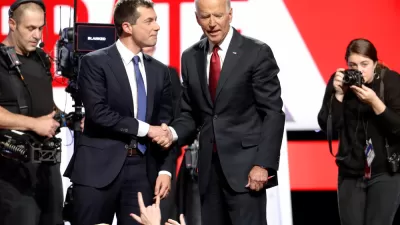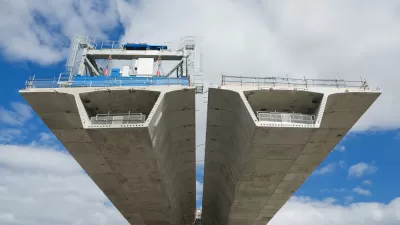The Trump Administration signaled a desire to scrap a funding program that helped fund transit, pedestrian, and bike infrastructure. A new program likely focused on rural and toll roads could take its place.

Update 1/3: Streetsblog USA is reporting that Secretary Elaine Chao did not announce that the Department of Transportation would cut the TIGER program. Further updates coming.
Update 2/3: a tweet by Yonah Freemark indicates that reports of the TIGER grant program's demise are premature. The Trump Administration draft budget proposal would cut the TIGER grant program, but the program can still be funded during the appropriations process.
As with many fed transport programs, the admin budget proposes cutting it, but if congress keeps appropriating funds, it will continue. Same with New Starts.
— Yonah Freemark (@yfreemark) March 7, 2018
Update 3/3: Streetsblog USA has posted a correction to the post reported below. According to the correction post, the error is in a misreading of Secretary Chao's remarks.
Original Post:
Angie Schmitt reports: "one year into the Trump administration, TIGER is officially on the way out."
U.S. Department of Transportation Secretary Elaine Chao told a House Transportation and Infrastructure Committee this week that the next round of TIGER grants would be the last. The Trump Administration is killing the program despite its popularity with congressional representation on both sides of the aisle.
Funding previously devoted to TIGER grants will now be switched to the new INFRA grant program. Schmitt explains what's known so far about INFRA:
The “INFRA” grant program is new, and it’s hard to know exactly what Trump’s DOT intends to do with it. Early signs point to a program that emphasizes rural projects and toll road construction, however. The program description on the U.S. DOT website starts off saying it will “address critical issues facing our nation’s highways and bridges highways and bridges” and never mentions walking, biking, or transit. It’s also replete with jargon about private-public partnerships and “leveraging capital.”
The article includes background on the TIGER grant program and the incremental evolution it represented for federal transportation funding, as well as some early speculation on the kind of grant-funded projects that will result from the new INFRA approach.
FULL STORY: The Trump DOT Is Killing the TIGER Program

Planetizen Federal Action Tracker
A weekly monitor of how Trump’s orders and actions are impacting planners and planning in America.

San Francisco's School District Spent $105M To Build Affordable Housing for Teachers — And That's Just the Beginning
SFUSD joins a growing list of school districts using their land holdings to address housing affordability challenges faced by their own employees.

The Tiny, Adorable $7,000 Car Turning Japan Onto EVs
The single seat Mibot charges from a regular plug as quickly as an iPad, and is about half the price of an average EV.

As Trump Phases Out FEMA, Is It Time to Flee the Floodplains?
With less federal funding available for disaster relief efforts, the need to relocate at-risk communities is more urgent than ever.

With Protected Lanes, 460% More People Commute by Bike
For those needing more ammo, more data proving what we already knew is here.

In More Metros Than You’d Think, Suburbs are Now More Expensive Than the City
If you're moving to the burbs to save on square footage, data shows you should think again.
Urban Design for Planners 1: Software Tools
This six-course series explores essential urban design concepts using open source software and equips planners with the tools they need to participate fully in the urban design process.
Planning for Universal Design
Learn the tools for implementing Universal Design in planning regulations.
Smith Gee Studio
City of Charlotte
City of Camden Redevelopment Agency
City of Astoria
Transportation Research & Education Center (TREC) at Portland State University
US High Speed Rail Association
City of Camden Redevelopment Agency
Municipality of Princeton (NJ)





























